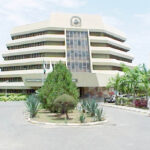The idea of introducing the Treasury Single Account (TSA) was mulled over by the administration of President Goodluck Jonathan in 2012, but was aborted because it caused trepidation among bankers and other public money managers in the country. However, it took off in September, 2015, when Muhammadu Buhari took office as president.
Buhari’s first Minister of Finance, Mrs Kemi Adeosun, explained the advantages of the TSA, as, prior to becoming minister she gained experience in implementing the TSA as Commissioner for Finance in Ogun State during the administration of Gov Ibikunle Amosun.
Mrs Adeosun told the Senate during her screening to become minister that over 500 Ogun government accounts, some of them dormant, were placed under the TSA, which completely blocked leakages in government revenue and ensured availability of money for human capacity and infrastructural development in the state.
Mrs Adeosun highlighted more advantages of the TSA during workshops, retreats and meetings with finance commissioners and at media conferences.
- Supreme Court affirms Eno as Akwa Ibom gov
- Edugate: CISLAC rejects appointment of Enitan as humanitarian affairs ministry overseer
She often explained to her audiences that the TSA facilitated effective reconciliation between the government’s accounts and cash flow statements from banks.
Other benefits derived from the TSA include consolidating government cash balances which gives the Accountant General of the Federation (AGF) and the Ministry of Finance real-time overview of government cash flows thereby improving budget control and monitoring.
More objectives and benefits of the TSA were listed in a February, 2016, guidelines issued by the Central Bank of Nigeria (CBN) for the implementation of the TSA by states.
The enthronement of a centralised, transparent and accountable revenue management system, facilitating effective cash management and ensuring cash availability at all times are among the key objectives.
It is also aimed at promoting efficient management of domestic borrowing at minimal costs and allows optimal investment of idle cash.
The CBN further said in the guidelines that the TSA was designed to eliminate operational inefficiency and costs associated with maintaining multiple accounts in multiple financial institutions.
Indeed, multiple accounts were rampantly operated in multiple financial institutions by Ministries, Departments and Agencies (MDAs). The federal government announced in February, 2017, while marking the first anniversary of the TSA that 20,000 of such accounts were closed and the N5.24trn in them moved to the TSA.
In November, 2017, ex-President Buhari disclosed at the National Information Technology Development Agency’s (NITDA’s) e-Nigeria Conference that the TSA and the Biometric Verification Number (BVN) had stopped the leakage of N24.7bn public funds monthly.
Years after ex-President Jonathan proposed it and its beneficial implementation by the All Progressives Congress (APC) administration of ex-President Buhari, the APC-led administration of President Bola Tinubu has apparently modified or terminated it via a circular from the Ministry of Finance.
The notification, on December 28, 2023, directed all MDAs fully funded by the federal government to henceforth remit 100 per cent of their revenues into a Sub-Recurrent Account – a sub-component of the Consolidated Revenue Fund (CRF).
The circular was designed “to improve revenue generation, fiscal discipline, accountability and transparency.”
This directive has effectively ended the TSA as operated by the Buhari administration.
So, Nigerians are waiting for the benefits of the modified or new TSA.
Salisu Na’inna Dambatta was Director of Information in the Federal Ministry of Finance.
 Join Daily Trust WhatsApp Community For Quick Access To News and Happenings Around You.
Join Daily Trust WhatsApp Community For Quick Access To News and Happenings Around You.


